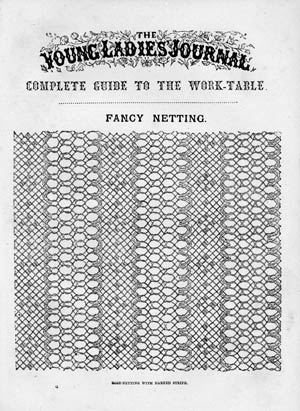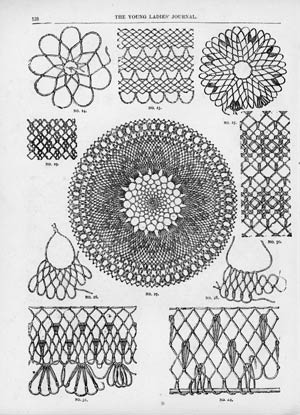![]()
NOTES ON ISSUE 6: GLOSSARY
"Oh, my friends,
the down-trodden operatives of Coketown! Oh, my friends and fellow-countrymen,
the slaves of an iron-handed and a grinding despotism! Oh, my friends and fellow-sufferers,
and fellow-workmen, and fellow-men! I tell you that the hour is come when we
must rally round one another as One united power…"
Dickens's union orator, Slackbridge, whose words open this installment of Hard
Times, is partly based on Dickens's own observations during the 1853-54
strike in Preston, a Lancashire cotton town. One of its leaders, Mortimer Grimshaw,
inspired the portrayal of Slackbridge, which is notable for Dickens's air of
hostility toward the union leader—despite his support for the workers' plight
generally.
The lengthy Preston strike was heavily covered in the press at the time. Another
prominent (and less inflammatorily radical) leader of the strike, George Cowell,
was depicted speaking to the striking workers in the Illustrated London News
of November 12, 1853, as shown below.
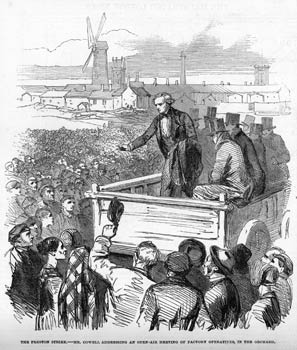
The illustration was titled "The Preston Strike—Mr. Cowell addressing an open-air meeting of factory operatives in the Orchard." A view of the town of Preston itself appeared in the Illustrated London News on September 10, 1842.
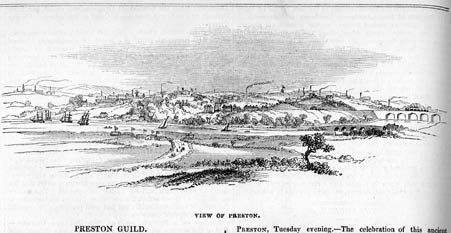
"Good!" "Hear, hear, hear!"
"Hurrah!" and other cries, arose in many voices from various parts
of the densely crowded and suffocatingly close Hall, in which the orator, perched
on a stage, delivered himself of this and what other froth and fume he had in
him.
The "hall" Dickens describes here is based
on the Temperance Hall in Preston, which he saw on his stay in Preston. During
the strike there, workers regularly held meetings of delegates in the hall on
Sundays, and on Mondays the striking workers received their relief payments
there. This depiction of Temperance Hall during the strike, showing the distribution
of these payments, appeared in the Illustrated London News on November
12, 1853.
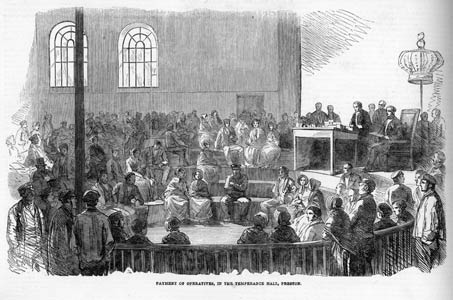
resolve for to subscribe to the funds of the
United Aggregate Tribunal, and to abide by the injunctions issued by that body
for your benefit, whatever they may be
At the time Dickens wrote, unions tended to be occupation-specific.
In the Lancashire cotton industry, for instance, there were associations for
power loom weavers, spinner, and so on, some of which were short-lived. During
the Preston strike, however, the various trade unions of the area worked cooperatively
and with efficiency to coordinate their demands. Here, the union organizer Slackbridge
seems to be calling for a general union that would bring all the trades together
into a "united aggregate tribunal." Dickens, who drew heavily on his
observations of the Preston strike for this episode, may also have been thinking
of a strike of engineers that took place in 1852. That strike was called by
a large and prestigious union, the Amalgamated Society of Engineers, which was
portrayed in the press as despotic.
The idea that smaller unions might combine into large and extremely powerful
organizations across many trades, industries and regions fed bourgeois Victorian
fears of a workers' revolt. Here, Slackbridge's rhetoric may underscore that
fear, as he calls upon the workers to join and to "abide by the injunctions"
issued by the union, "whatever they may be." Nevertheless, workers
and organizers had from an early time seen the benefit in working cooperatively,
and they would continue to do so. One large union meeting, which took place
in Birmingham in 1832, is depicted in Robert Kirkup Dent's Old and New Birmingham
(1880).
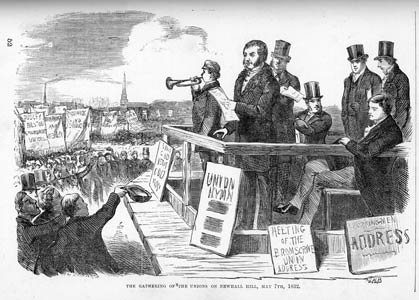
Castlereagh existed
Robert Stewart, Viscount Castlereagh, was Britain's Foreign
Secretary from 1812-1822. He was seen as responsible for the decision to mobilize
troops during a peaceful meeting of 80,000 people in favor of parliamentary
reform outside Manchester in August 1819. Eleven people were killed and 400
injured in the Peterloo Massacre. His name thus became a byword for treachery
and oppression among the working classes. Castlereagh committed suicide in 1822,
and crowds followed his funeral procession through the London streets, cheering.
"…there'll be a threat to turn out if I'm let
to work among yo."
To "turn out" is to strike. Stephen is here
referring to the common practice of unions setting up a closed shop. The unions'
demands to prevent unskilled, nonunion labor from working among them was a major
issue and the cause of strikes in the 1850s, but Dickens—unlike many industrial
novelists of the day—had no wish to portray an actual strike.
"I who ha worked sin I were no heighth at
aw"
The Factory Act of 1819 (when Stephen would have been
about five years old) made it illegal to employ children under nine in factories.
However, as with other laws regulating industry, factory owners sometimes simply
ignored such regulations. Further restrictions had been placed on child labor
in 1833 and 1844, including the requirement that working children be given some
schooling.
"Had not the Roman Brutus, oh, my British countrymen,
condemned his son to death; and had not the Spartan mothers, oh, my soon to
be victorious friends, driven their flying children on the points of their enemies'
swords?"
Lucius Junius Brutus, founder of the Roman Republic in
509 B.C. and first Consul of Rome, had his two sons put to death for conspiring
against the state. The Spartans were notorious for being trained never to retreat
in battle, so Spartan mothers would encouraged their sons to sacrifice themselves
rather than retreat.
fugleman
A soldier trained to march at the front of a regiment,
to serve as an example or model to the troops.
sent to Coventry
Alienated or ostracized. The origin of the term is uncertain,
but Brewer's Dictionary of Phrase and Fable gives the following explanation:
According to Messrs. Chambers (Cyclopedia), the citizens of Coventry had at one time so great a dislike to soldiers that a woman seen speaking to one was instantly tabooed. No intercourse was ever allowed between the garrison and the town; hence, when a soldier was sent to Coventry, he was cut off from all social intercourse.
"a set of rascals and rebels whom transportation
is too good for!"
Transportation was the practice of sending convicted
criminals to overseas penal settlements, most notably Australia. Dickens used
transportation as a plot device in Great Expectations; the practice
ended in 1868.
"fur to weave, an' to card, and to piece out
a livin'"
Carding involved raking raw, partially cleaned cotton
into parallel fibers, preparatory to spinning it into thread. Those who worked
in carding rooms were often subject to lung complaints (see Issue 5). The phrase
"piece out a livin" may allude to the practice of paying workers by
the piece instead of by the hour.
"goes up wi' yor deputations to Secretaries
o' State 'bout us…"
In January, 1854, mill-owners and manufacturers sent
a deputation to Lord Palmerston, the Home Secretary, to protest new manufacturing
regulations.
"we'll indict the blackguards for felony, and
get 'em shipped off to penal settlements."
Union organizers and laborers were indeed transported
for various trumped-up offenses. The so-called Tolpuddle Martyrs (six workers
from the town of Tolpuddle, accused of trade unionism) were sentenced in 1834
under the 1797 Act against Unlawful Oaths. They were transported but subsequently
pardoned and allowed to return to England. Closer to the time Dickens was writing,
in March 1854, labor delegates in Preston had been arrested on charges of conspiracy,
although the charges were subsequently dropped.
Norfolk Island
A particularly remote and harsh penal settlement, some 1000 miles off the coast
of Australia. Transportation to Norfolk Island was reserved for the worst offenders
(often those who had committed second crimes while in custody in Australia),
and conditions there were dreadful. Its use as a penal colony was discontinued
in 1855.
This illustration of Norfolk Island appeared in the Illustrated London News
on June 12, 1847:
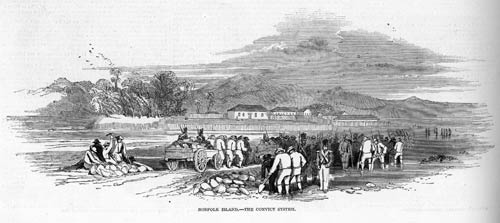
"The strong hand will never do 't. Vict'ry
and triumph will never do 't. Agreeing fur to mak' one side, unnat'rally awlus
and forever right, and toother side unnat'rally awlus and forever wrong will
never, never do 't. Nor yet lett' alone will never do 't."
In February 1854, Dickens published an article called
"On Strike" in Household Words, which concluded with words
to similar effect:
...in the gulf of separation it hourly deepens between those whose interests must be understood to be identical or must be destroyed, it is a great national affliction. But, at this pass, anger is of no use, starving out is of no use…. Masters right, or men right; masters wrong, or men wrong; both right, or both wrong; there is a certain ruin to both in the continuance or frequent revival of this breach. And from the ever-widening circle of their decay, what drop in the ocean shall be free!
the Travellers' Coffee House down by the railroad
Refreshment houses and waiting rooms in or near railway
stations were commonplace by the 1840s, replacing coach inns.
The bread was new and crusty, the butter
fresh, and the sugar lump, of course
In Victorian times, sugar was sold in hard loaves, not
finely granulated. The foods mentioned—good bread, fresh butter, and more expensive
white sugar—indicate that Stephen has access to (and money for) decent, though
limited foods, particularly when he is entertaining guests. The adulteration
of food and the poor quality of food sold to the poor—including rancid butter,
heavy or adulterated bread, and tea that was reused or cut with other ingredients—was
a problem in the nineteenth century, particularly in large cities.
so large a party necessitated the borrowing
of a cup
It was commonplace for laborers to have no more dishes,
cutlery, or furniture than would meet the immediate needs of their own households,
because of the expense of such objects.
